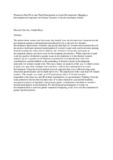Please use this identifier to cite or link to this item:
https://cris.library.msu.ac.zw//handle/11408/4046Full metadata record
| DC Field | Value | Language |
|---|---|---|
| dc.contributor.author | Maruzani, Nyevero | - |
| dc.contributor.author | Moyo, Annah | - |
| dc.date.accessioned | 2020-12-14T09:59:06Z | - |
| dc.date.available | 2020-12-14T09:59:06Z | - |
| dc.date.issued | 2010-09 | - |
| dc.identifier.issn | 2454-6186 | - |
| dc.identifier.uri | https://www.rsisinternational.org/journals/ijriss/Digital-Library/volume-4-issue-9/203-211.pdf | - |
| dc.identifier.uri | http://hdl.handle.net/11408/4046 | - |
| dc.description.abstract | The debate about women and the extent they benefit from development has characterised the development agenda at international and national levels in the past few decades. Development practitioners, feminists and groups that fight for women empowerment have in the process facilitated increased participation of women in paid work and in decision making. Notwithstanding the achievements hitherto, the realisation of equality and equity in development remains an elusive task for development practitioners. While exposure to paid work has positive dividends to gender issues in development, it is the limited research attention given to gender social relations in production and reproduction which has contributed to a partial address or the worsening of women’s issues in development especially for women in paid work. This study makes an analysis of the way in which women in paid work play their multiples roles and how it affects their participation in social development. Using the mixed method research approach data were collected using semi- structured questionnaires and in depth interviews. The population of the study had 150 female teachers. The sample was made up of 95 participants where 15 female teachers responded to the interview and 80 of them responded to the questionnaire. Findings from the study pointed to the fact that multiple roles of women situated in a patriarchal tradition, retrogressive pieces of legislation and primary gender socialisation contribute to women’s limited participation in development. For the increased participation of women in development there is need for gender responsive budgeting at all levels and the enactment of gender specific policies. | en_US |
| dc.language.iso | en | en_US |
| dc.publisher | International Journal of Research and Innovation in Social Science (IJRISS) | en_US |
| dc.relation.ispartofseries | Volume IV, Issue IX; | - |
| dc.subject | female teacher | en_US |
| dc.subject | gender responsive budgeting | en_US |
| dc.subject | multiple gender roles | en_US |
| dc.subject | social development | en_US |
| dc.subject | woman’s paid work | en_US |
| dc.title | Women in paid work and their participation in social development: mapping a developmental trajectory for female teachers in Mkoba Secondary | en_US |
| dc.type | Article | en_US |
| item.grantfulltext | open | - |
| item.cerifentitytype | Publications | - |
| item.languageiso639-1 | en | - |
| item.openairecristype | http://purl.org/coar/resource_type/c_18cf | - |
| item.openairetype | Article | - |
| item.fulltext | With Fulltext | - |
| Appears in Collections: | Research Papers | |
Files in This Item:
| File | Description | Size | Format | |
|---|---|---|---|---|
| Women in Paid Work and Their Participation in Social Development.pdf | Abstract | 69.03 kB | Adobe PDF |  View/Open |
Page view(s)
226
checked on Feb 15, 2026
Download(s)
74
checked on Feb 15, 2026
Google ScholarTM
Check
Items in MSUIR are protected by copyright, with all rights reserved, unless otherwise indicated.



